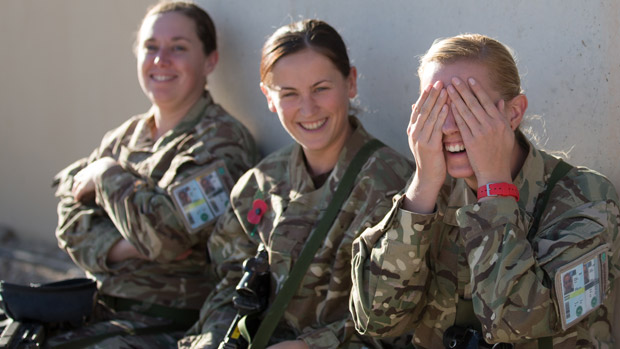Women at war: should female soldiers serve in close combat?
As more countries agree to allow women to serve in combat roles, the issue remains divisive in the UK

A free daily email with the biggest news stories of the day – and the best features from TheWeek.com
You are now subscribed
Your newsletter sign-up was successful
The government is due to publish its findings on whether or not to allow women to serve in close combat in the coming weeks, even though strong opposition to the move remains.
Women are currently allowed to serve on the frontline providing medical care and carrying out bomb disposals, but are not permitted to serve in the infantry, the Royal Armoured Corps or the Household Cavalry where they would be involved in close combat.
There are now more women serving in the armed forces than in any other period since the end of the Second World War, official figures show, and women make up 10 per cent of all military personnel.
The Week
Escape your echo chamber. Get the facts behind the news, plus analysis from multiple perspectives.

Sign up for The Week's Free Newsletters
From our morning news briefing to a weekly Good News Newsletter, get the best of The Week delivered directly to your inbox.
From our morning news briefing to a weekly Good News Newsletter, get the best of The Week delivered directly to your inbox.
Female soldiers are allowed to serve in combat roles in other countries including the US, Australia, France and Israel, and commentators argue that Britain is lagging behind. "Times have changed," argues the BBC's defence correspondent Caroline Wyatt, and the UK should be working towards improving equality in the armed forces.
But many within the military, including some women, remain opposed to the move.
The arguments against:
In 2010, a review into the matter concluded that the effects that gender mixing would have on "team cohesion" were unknown and could have "far-reaching and grave consequences", suggesting that women could be a distraction to men on the frontline.
A free daily email with the biggest news stories of the day – and the best features from TheWeek.com
Others continue to argue that women should not be allowed in the roles as they are not as physically fit as men. Major Judy Webb told the BBC that she would not support a change in policy because of the physiological differences between men and women. "We don't have the same upper-body strength," she said.
Former commander of British forces in Afghanistan, Richard Kemp agrees. "Physically and emotionally, few women will have the aptitude to join the combat arms," he writes in the Times.
There are widespread concerns that the inclusion of women in the military will result in lower physical standards for all soldiers, as, they argue, women will be unable to meet current fitness targets.
Kemp also argues that a women's presence on the battlefield could put lives in danger. "No matter how courageous or physically tough a woman might be, she simply does not fit into this testosterone-charged band of brothers and is therefore likely to reduce the cohesion and fighting effectiveness of a small combat unit."
The arguments for:
Brigadier Nicky Moffat, the highest-ranking woman in the British army until she retired in 2012, said the arguments against women serving in combat roles were the "same that used to be trotted out to exclude women from the wider range of roles in which they are now allowed to serve".
Others argue that the same concerns about "team cohesion" were brought up in arguments against gay and lesbian soldiers serving in the military, "yet morale on the frontline [does] not appear to have suffered since the ban was lifted in 2000," argues Wyatt.
When calling for this year's review, former secretary of defence Phillip Hammond said the army needed to overcome its "macho image" of being the "last bastion of male chauvinism" and send the right message about gender equality in the armed forces.
Labour MP Gisela Stuart, a member of the Defence Select Committee, says she accepts that the job requires certain abilities and physical aptitude, but "if you meet those requirements you should be able to do the job whether you are a man or a woman".
What is likely to happen?
"It is almost certain the review will recommend lifting the ban," predicts Kemp, and many other commentators agree. But, even if women are finally allowed to take part in all aspects of military service, "their first fight will be to prove themselves physically and mentally up to the immense challenge, and win round the sceptics", says Wyatt.
-
 Local elections 2026: where are they and who is expected to win?
Local elections 2026: where are they and who is expected to win?The Explainer Labour is braced for heavy losses and U-turn on postponing some council elections hasn’t helped the party’s prospects
-
 6 of the world’s most accessible destinations
6 of the world’s most accessible destinationsThe Week Recommends Experience all of Berlin, Singapore and Sydney
-
 How the FCC’s ‘equal time’ rule works
How the FCC’s ‘equal time’ rule worksIn the Spotlight The law is at the heart of the Colbert-CBS conflict